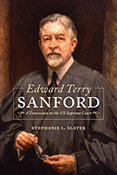Edward Terry Sanford
A Tennessean on the U.S. Supreme Court

In Edward Terry Sanford: A Tennessean on the U.S. Supreme Court, Stephanie Slater uncovers the life and work of Edward Terry Sanford (1865–1930), the only Supreme Court justice who obtained his undergraduate degree from the University of Tennessee. Born and raised in Knoxville, Sanford served as an associate justice on the United States Supreme Court from 1923 until his death in 1930. He was one of only six Tennesseans to serve on the nation’s highest Court.
Slater’s delineation of Sanford’s contributions to the legal profession illuminates one of Tennessee’s favorite sons whose story had, until now, been largely left in the dark. Slater frames Sanford’s personality and jurisprudence in a post-Civil War and Taft-era context, one that helps readers better understand both the man and his contributions to the Supreme Court.
From Slater’s important work we learn about Sanford’s early upbringing, the lasting impression a largely pro-Union East Tennessee would leave upon Sanford, his rise from a skilled lawyer to federal judge during the rapid industrialization of Knoxville and the surrounding area, and his eventual appointment to the Supreme Court. Within Sanford’s rich legacy is the pivotal role he played in writing the majority opinion in the landmark 1925 case, Gitlow v. New York, a decision which became a critical legal precedent for the expansion of civil rights and civil liberties in the 1950s and 1960s.
Slater provides a keen look into the life of a Knoxville native whose life and career may now be appreciated and studied by a new generation. Sanford, his character, and his life as a Tennessean on the Supreme Court are sure to intrigue legal scholars, students of Tennessee culture and history, and general audiences alike.
Stephanie L. Slater, a three-time graduate of the University of Tennessee, has worked in the state and federal court systems in Tennessee since obtaining her J.D. in 1990. Her articles have appeared in the Journal of Supreme Court History and Tennessee Law Review.
